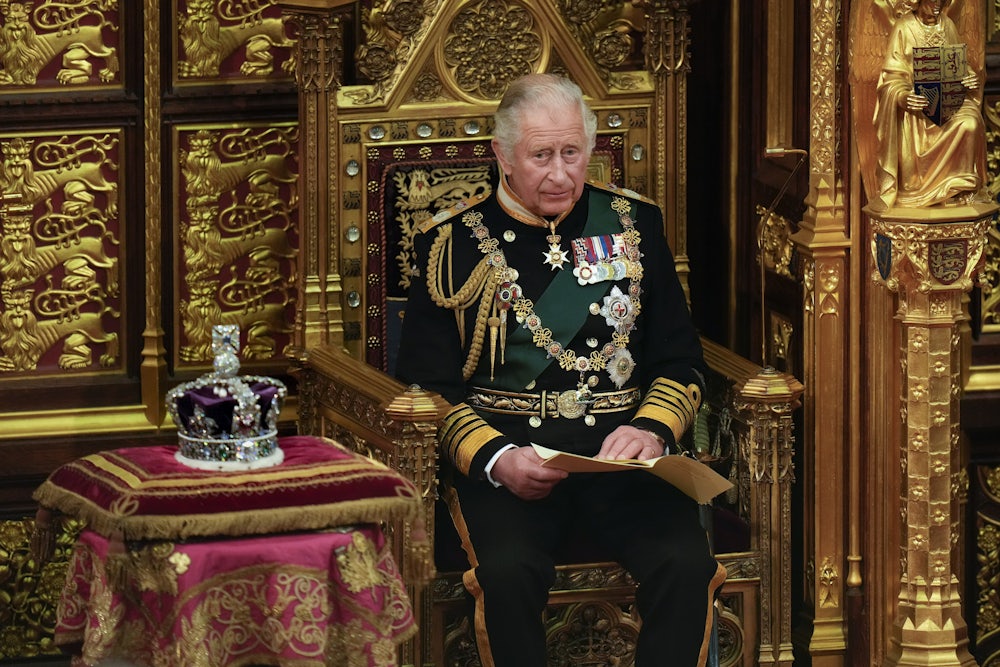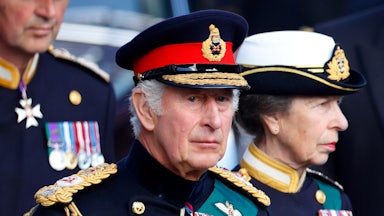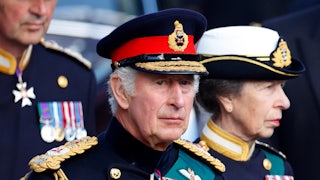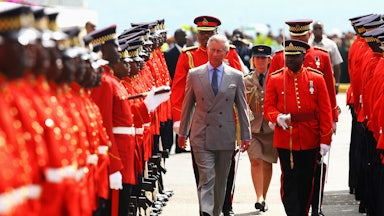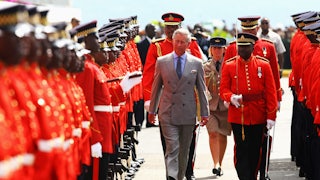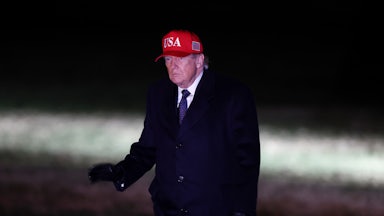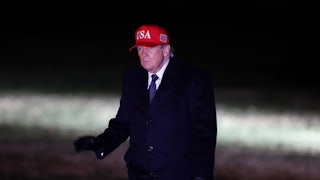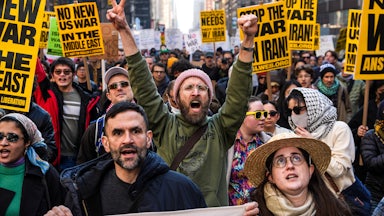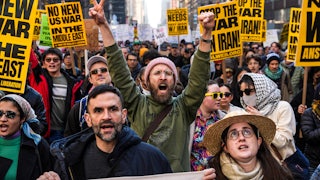There’s a strong sentiment out there that Americans shouldn’t be interested in the British monarchy. Whenever there is some sort of major royal event—a wedding, a funeral, a new season of The Crown—there are those who remind us that we fought a revolution to get away from these people. The idea of elevating one person and one family above the rest of us is more than wrong, it is unseemly.
“Yes, we have our own hypnotic capitalist addiction to celebrity, but monarchy is something altogether more twisted—as if the Bush family, the Kardashians, and the Falwells were all rolled into one bejeweled quasi-religious fame cult, topped off with a bracing dose of imperialism,” Hamilton Nolan wrote for The New York Times in 2019, shortly after Prince Harry and his wife Meghan Markle gave a blockbuster interview to Oprah about the rough treatment they have received from the rest of the royal family.
Similar sentiments will likely surround the coronation of Charles III on Saturday. Charles became king immediately upon the death of his mother, Elizabeth II, last September under British law. The coronation merely confirms and sacralizes his inheritance. Charles will be crowned, enthroned, handed various scepters and swords, receive various oaths of allegiance, and anointed in holy oil that was consecrated in Jerusalem itself. Some aspects of the ceremony are more than a millennium old. Others are not. The holy oil, for example, is now cruelty-free.
Charles’s ascent is not important because he actually has a divine right to reign over the United Kingdom of Great Britain and Northern Ireland and roughly a dozen other countries. Nor is it important because Harry is attending without Meghan in either a brave stand against his abusive family or a rude snub of his well-intentioned father. The British monarchy is important because its leader wields no small amount of power over a nuclear-armed global financial hub with a permanent seat on the United Nations Security Council. And Charles’s coronation matters because he, more than any other recent king or queen, is more likely to upend the whole thing.
Charles Windsor does not merely live in various palaces and hand out knighthoods. Legally speaking, he is the British state. He summons and dismisses Parliament. He approves all legislation. He is the commander in chief of the British armed forces. He is the supreme governor of the established Church of England. He is immune from criminal prosecution and civil litigation. British ministers, prime and otherwise, exercise all power in his name. Party leaders ritualistically travel to Buckingham Palace after winning an election so that the monarch can invite them to form a government on his behalf—not the people’s.
Yes, yes, yes, the British will say, but that’s all just a big show. They insist that they have an unwritten constitution—which is a polite way of saying that they have no constitution at all—and that under its terms, the king is a powerless figurehead. This is only half-true. Parliament has an arrangement of sorts with the British monarchy. I will call it the Arrangement out of respect for British historians, who love doing things like that—the Heptarchy, the Anarchy, the Restoration, the Glorious Revolution, the Abdication and so on. Under the Arrangement, the king will exercise all but the most mundane of his royal powers only as the prime minister sees fit. In return for this, Parliament will not execute the king for high treason, as it did to Charles I in 1649, or replace him with a more pliable member of his family, as it did to James II in 1688.
The Arrangement, in its broadest form, has remained more or less intact since James II. No British monarch has vetoed an act of Parliament since Queen Anne declined to sign a Scottish militia bill in 1708, and even that was at the government’s request. No British monarch has fired a prime minister since 1834, implicitly leaving that decision up to either Parliament or the British electorate thereafter. Thanks to the Arrangement, Britain’s kings and queens have dutifully intervened on the prime minister’s side in constitutional crises, most famously in 1911 when George V helped the Liberals break the House of Lords’ power to reject bills from the Commons.
But to say that the king has no power or influence is not quite accurate. For one thing, he retains personal control over the Duchy of Lancaster, which began as a feudal estate in medieval times and now resembles an investment portfolio. Its holdings include real estate, farms, historical buildings, and other revenue-producing assets. Charles’s son William owns the Duchy of Cornwall, a similar enterprise that provides him with income independent of Parliament. These bodies are different from the Crown Estate, which is owned by the monarchy as an institution and sends its revenues directly to the Treasury. For some Britons, Charles and William aren’t just tabloid figures. They are also landlords.
In 2021, The Guardian published an investigative series on a mechanism now known as “King’s consent.” Under this process, government ministers must ask permission from the monarch to debate certain provisions in pending bills that could affect the monarchy or its holdings. It was assumed that this was merely a procedural formality like much of the monarch’s role in day-to-day governance. But The Guardian uncovered multiple instances where Buckingham Palace pushed for amendments to bills that benefited the royal family. Among them were exemptions to Scottish climate laws for the family’s landholdings in Scotland and a provision that allowed them to block Duchy of Cornwall tenants from buying their homes.
Beyond King’s consent, Charles himself has also played a more direct role in trying to influence legislation. After a 10-year legal battle, the British government released a series of memos in 2015 that detailed how the then Prince of Wales had secretly lobbied ministers on various pet issues ranging from alternative medicine to badger culls, to helicopters in the Iraq War. It’s long been reported by British media outlets that Charles, as heir, wanted to more vocally champion issues that were close to his heart. Whether he will do so as monarch will be hard to discern: After the memo’s disclosure, Parliament upgraded the royal family’s exemption to freedom-of-information laws to be absolute.
It would be easy to ask at this point why there is still a British monarchy in 2023. Surely all of Charles’s head-of-state duties could be done by an elected president or chancellor, like in Germany, Italy, or other post-monarchical countries in continental Europe? And the most common replies are that the British monarchy doesn’t actually do anything, that the royal family is good for tourism and international prestige, that Britain is effectively a modern democratic state despite the Windsors, that other European countries still have monarchs and it’s not really that unusual, and so on.
The most important factor is that the British people don’t really want to change it. Republicanism is such a fringe position that the word itself almost exclusively refers to Irish independence and reunification, not to evictions at Buckingham Palace. (Unlike some of their palaces, that one is state-owned.) Anti-monarchism is also more of an aesthetic stance than a political one. This is not to say that there are no republicans or republican organizations in Britain, of course, but the movement does not influence day-to-day politics in the way that other interest groups might. More importantly, there is also no major British political party that supports abolishing the monarchy, even in theory.
One might think the Labour Party, with its long socialist history and its modern leftward leanings, would be the natural repository for such sentiments. But Labour has never been a republican party at any point throughout its history, either officially or unofficially. At least some of this is pragmatic since the British monarchy has been widely popular throughout the party’s history. Jeremy Corbyn, an avowed hard-left republican who led the party from 2015 to 2019, declared after becoming leader that overthrowing the monarchy was “not a battle I am fighting.” Taking on capitalism was one thing; taking on the Windsors was quite another.
Labour’s historical aversion to republicanism is also somewhat ideological in nature. Clement Attlee, the party’s great postwar leader who oversaw the creation of the British welfare state and the initial wave of decolonization, wrote candidly in 1959 that he had “never been a republican even in theory, and certainly not in practice.” He noted that he and his fellow Labour leaders had long accepted that capitalism, not the king, “was the enemy.” And he noted that some of the greatest examples of democratic socialism of that time—Norway, Sweden, and Denmark—all had constitutional monarchs.
Less abstractly, Attlee supported the monarchy as a counterweight to potential dictatorship. He expressed discomfort with “the serious disadvantage of combining in one person the symbol of the nation and the party leader,” as had happened to disastrous effect in other countries in recent memory. “A monarch is a kind of referee, although the occasions when he or she has to blow the whistle are nowadays very few,” he wrote. Attlee also argued that even in the United States, the world’s leading republic, presidents wielded broad powers based on their personal and political interests. “A British king making himself a dictator is unthinkable, but many thoughtful Americans would not deny that a president might do so,” he added.
An even greater specter than the American presidency also looms over discussions of a British republic. After Parliament executed Charles I in 1649, it abolished the monarchy and set up Britain’s first experiment with republican government. Things did not go well. An unpleasant man named Oliver Cromwell, with the help of the army, seized power as Lord Protector and purged the Commons of dissenters. Cromwell and his allies steadily devolved the Commonwealth of Britain into a pseudo-monarchy, with a pseudo-coronation on St. Edward’s Chair, a pseudo–House of Lords to balance out the Commons, and even a pseudo-hereditary system whereby he could nominate his own successor. He chose his unimpressive son, who lasted about a year before one of the generals duly overthrew him and restored Charles I’s son to the throne.* Cromwell’s regime also committed some light genocide in Ireland along the way.
Indeed, the greatest impediment to abolishing the British monarchy has always been figuring out what would replace it. Swapping in a presidency was the easiest choice for many former colonies; Barbados turned its last governor-general into its first president when it became a republic two years ago. But Australia’s 1999 referendum on the matter narrowly failed over dissatisfaction with its proposed solution: a president chosen by the Australian parliament instead of a direct election by the people. For Britain itself, installing a president would either mean transferring most of the monarchy’s powers to that office, revising countless laws to create some sort of new system that preserves parliamentary supremacy, or writing an actual constitution. It is unsurprising that the establishment favors keeping the Arrangement over all that work.
So, yes, the British monarchy is strange and outdated and an endless gristmill for tabloid gossip. It is very weird that such an institution exists in modern society; it would be unthinkable to create it from scratch if it did not already exist. But it is also more influential than it seems, contra its continental counterparts, and it is now led by a man who has chafed at the unspoken constraints that exiled him from political discourse. Its fate affects the structure of governments of more than a dozen countries, including one of the closest allies of the United States and one of the wealthiest nations on the planet. The coronation may or may not be worth watching, but Charles III will be.
* This post originally misidentified the line of succession.
